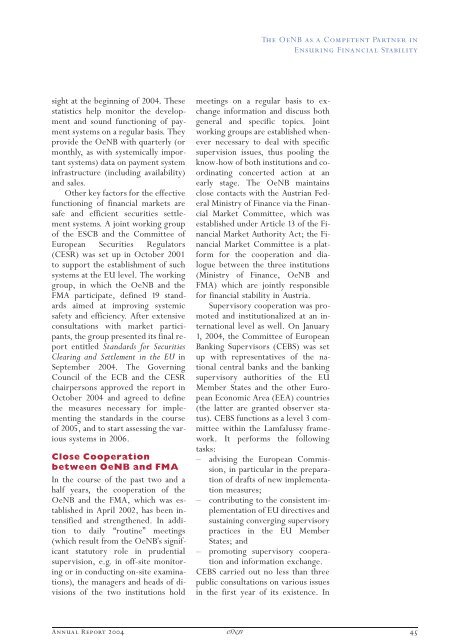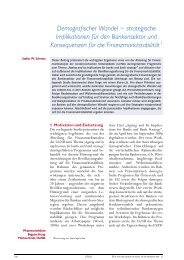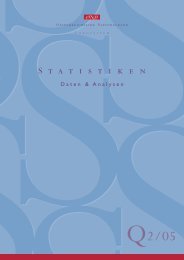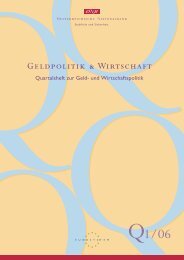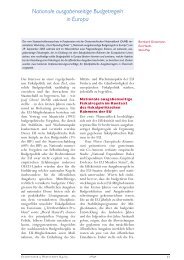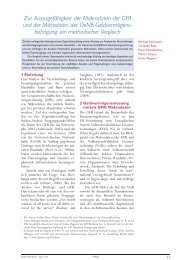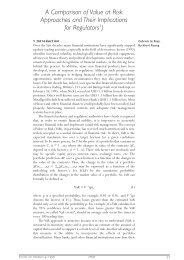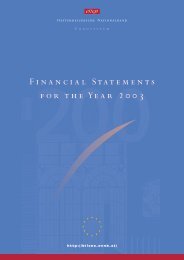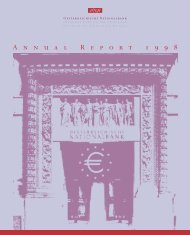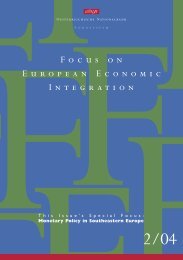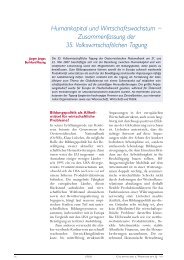Create successful ePaper yourself
Turn your PDF publications into a flip-book with our unique Google optimized e-Paper software.
sight at the beginning of <strong>2004</strong>. These<br />
statistics help monitor the development<br />
and sound functioning of payment<br />
systems on a regular basis. They<br />
provide the OeNB with quarterly (or<br />
monthly, as with systemically important<br />
systems) data on payment system<br />
infrastructure (including availability)<br />
and sales.<br />
Other key factors for the effective<br />
functioning of financial markets are<br />
safe and efficient securities settlement<br />
systems. A joint working group<br />
of the ESCB and the Committee of<br />
European Securities Regulators<br />
(CESR) was set up in October 2001<br />
to support the establishment of such<br />
systems at the EU level. The working<br />
group, in which the OeNB and the<br />
FMA participate, defined 19 standards<br />
aimed at improving systemic<br />
safety and efficiency. After extensive<br />
consultations with market participants,<br />
the group presented its final report<br />
entitled Standards for Securities<br />
Clearing and Settlement in the EU in<br />
September <strong>2004</strong>. The Governing<br />
Council of the ECB and the CESR<br />
chairpersons approved the report in<br />
October <strong>2004</strong> and agreed to define<br />
the measures necessary for implementing<br />
the standards in the course<br />
of 2005, and to start assessing the various<br />
systems in 2006.<br />
Close Cooperation<br />
between OeNB and FMA<br />
In the course of the past two and a<br />
half years, the cooperation of the<br />
OeNB and the FMA, which was establishedinApril2002,hasbeenintensified<br />
and strengthened. In addition<br />
to daily ÒroutineÓ meetings<br />
(which result from the OeNBÕs significant<br />
statutory role in prudential<br />
supervision, e.g. in off-site monitoring<br />
or in conducting on-site examinations),<br />
the managers and heads of divisions<br />
of the two institutions hold<br />
The OeNB as a Competent Partner in<br />
Ensuring Financial Stability<br />
meetings on a regular basis to exchange<br />
information and discuss both<br />
general and specific topics. Joint<br />
working groups are established whenever<br />
necessary to deal with specific<br />
supervision issues, thus pooling the<br />
know-how of both institutions and coordinating<br />
concerted action at an<br />
early stage. The OeNB maintains<br />
close contacts with the Austrian Federal<br />
Ministry of Finance via the Financial<br />
Market Committee, which was<br />
established under Article 13 of the Financial<br />
Market Authority Act; the Financial<br />
Market Committee is a platform<br />
for the cooperation and dialogue<br />
between the three institutions<br />
(Ministry of Finance, OeNB and<br />
FMA) which are jointly responsible<br />
for financial stability in Austria.<br />
Supervisory cooperation was promoted<br />
and institutionalized at an international<br />
level as well. On January<br />
1, <strong>2004</strong>, the Committee of European<br />
Banking Supervisors (CEBS) was set<br />
up with representatives of the national<br />
central banks and the banking<br />
supervisory authorities of the EU<br />
Member States and the other European<br />
Economic Area (EEA) countries<br />
(the latter are granted observer status).<br />
CEBS functions as a level 3 committee<br />
within the Lamfalussy framework.<br />
It performs the following<br />
tasks:<br />
— advising the European Commission,<br />
in particular in the preparation<br />
of drafts of new implementation<br />
measures;<br />
— contributing to the consistent implementation<br />
of EU directives and<br />
sustaining converging supervisory<br />
practices in the EU Member<br />
States; and<br />
— promoting supervisory cooperation<br />
and information exchange.<br />
CEBS carried out no less than three<br />
public consultations on various issues<br />
in the first year of its existence. In<br />
<strong>Annual</strong> <strong>Report</strong> <strong>2004</strong> ×<br />
45


